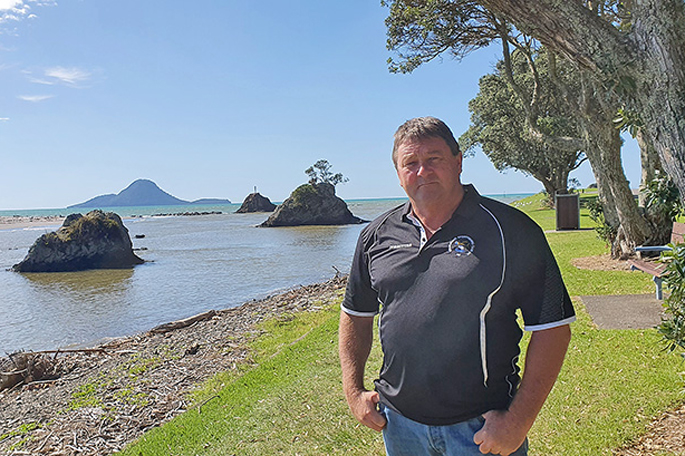Whakatāne Sport Fishing Club president Heyden Johnston says the decision to stop “calling the bar” on the river entrance may cost lives.
Bay of Plenty Regional Council harbourmaster Jon Jon Peters made the decision last week to stop the safety advisory service that assessed conditions on the bar every morning and provided that information to Coastguard and media outlets such as Radio 1XX.
Until last week, Jon Jon, who is based in Tauranga, has relied on Whakatāne-based contractors with long experience of using the Whakatāne port, to advise of levels of safety crossing the bar.
Jon Jon says the skipper of the boat is best placed to make the decision to cross the bar.
"The decision to cross a bar carries significant risk due to the number of variables in play. Expert advice given during a bar call does not have the hands-on and real time context the skipper of the vessel will have. For example, tide, sea state, time of day, skipper’s experience and the size and type of vessel."
He says a survey carried out recently shows skippers are using a range of technologies now available more commonly than the bar calling service.
Heyden says the fishing club has canvased its membership of more than 3000 fishers.
“We’ve had an overwhelming response of over 94 per cent of respondents have said that they utilise and would like to continue using the service,” he says.
Heyden, who has been boating in the Eastern Bay since his family first moved to Thornton more than 40 years ago, says calling the bar is the most important tool in the boating toolbox in order for skippers to assess risk, along with checking the Coastguard webcam, the tides and the weather.
“It reduces the risk considerably.”
He feels the webcam, weather reports and tides are not sufficient tools to judge conditions on the bar.
Heyden and his father, George, operate a rescue service on the Rangitaiki River entrance, out of Thornton, going back 40 years, and says a decision to extend the calling the bar service to Thornton made a noticeable difference to the number of incidents.
“We went from having multiple incidences, double-figured, to almost zero. It’s one every several years now. I don’t believe we’ve lost a life since that happened. To not have it, potentially, it’s going to see us revert back to a high number of incidents and loss of life.”
He feels there should have been consultation with both the sport fishing club and with Coastguard Whakatāne before any change was made.
“It’s the wrong attitude to take on human safety. It doesn’t make sense to get rid of something as simple and easy as this,” he says.
The regional council says the Whakatāne bar is the only one in the country with a bar calling service.
Heyden says it's wrong to draw comparisons as Whakatāne’s harbour is very different to any other port in New Zealand.
“This is one of the most highly utilised river ports in New Zealand. Here, it requires an expert opinion to understand what the risks are. We get a lot of tourists, we get a lot of people who don’t have any experience or any knowledge. They are the people who are most at risk.”
Charter boat operator Goose Haddock, who has been operating out of the Whakatāne port for 46 years, agrees that it's important for less experienced boaties, particularly those in smaller boats.
He says it's particularly important for people coming from out of town. Boaties came from as far away as Rotorua or Galatea.
“They can check the bar condition before they leave home. If they are trying to assess it once they get here, they’ve already travelled a long way. They’re less likely to want to turn around and go home and decide to risk it. I’ve seen it before.”
He says he didn't know there were plans to stop calling the bar until it it was announced last week.
“I saw it on Facebook one day and it was stopping the next day.”
Jo Jon says to support safe decision making on the water the regional council were continuing to focus on creating safer boating resources, supporting Coastguards’ bar awareness seminars and tutorials, enhancing existing bar cameras and encouraging all skippers to seek out skills they need to “have a safe and enjoyable day on the water”.
LDR is local body journalism co-funded by RNZ and NZ On Air.




2 comments
Hmmm
Posted on 10-03-2024 16:25 | By Let's get real
Totally agree.
Even the most experienced commercial operators use the service to prepare themselves for what to expect on that bar.
If we don't see lives lost, we can expect to see more issues for the coastguard at the very least.
It's simple...
Posted on 10-03-2024 16:56 | By morepork
...safety is the top priority and tools that improve that are ALL useful.
1. We want people to be safe.
2. 3000 people say they want the bar calling to be continued.
3. 3000 people could chip in and pay for the service. (Or some of them could volunteer to handle it on a rotating roster. (I would see someone recording a report daily, which could be linked to a web URL or on a phone number that would provide the report as a voice message. It doesn't have to be expensive or involve someone manning it 24/7.
4. The service should be reviewed, rather than cancelled.
Expecting it to be free or paid for by taxpayers who never go fishing is unreasonable.
Leave a Comment
You must be logged in to make a comment.